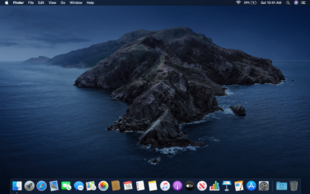MacOS Catalina
| Version of the macOS operating system | |
 Screenshot of the macOS Catalina desktop in dark mode
| |
| Developer | Apple Inc. |
|---|---|
| OS family | |
| Source model | Closed, with open source components |
| General availability |
October 7, 2019 |
| Latest release | 10.15.7 Security Update 2022-005 (19H2026) (July 20, 2022) [±] |
| Update method | Software Update |
| Platforms | x86-64 |
| Kernel type | Hybrid (XNU) |
| License | APSL and Apple EULA |
| Preceded by | macOS Mojave |
| Succeeded by | macOS Big Sur |
| Official website | www.apple.com/macos/catalina at the Wayback Machine (archived November 9, 2020) |
| Tagline | The power of Mac. Taken further. |
| Support status | |
| Unsupported as of November 30, 2022. Finder is still able to download driver updates to sync to newer devices. | |
macOS Catalina (version 10.15) is the sixteenth major release of macOS, Apple Inc.'s desktop operating system for Macintosh computers. It is the successor to macOS Mojave and was announced at WWDC 2019 on June 3, 2019 and released to the public on October 7, 2019. Catalina is the first version of macOS to support only 64-bit applications and the first to include Activation Lock. It is also the last version of macOS to have the major version number of 10; its successor, Big Sur, released on November 12, 2020, is version 11. In order to increase web compatibility, Safari, Chromium and Firefox have frozen the OS in the user agent running in subsequent releases of macOS at 10.15.7 Catalina.
The operating system is named after Santa Catalina Island, which is located off the coast of southern California.
macOS Catalina is the final version of macOS that supports the Unibody MacBook Pro, as its successor, macOS Big Sur, drops support for its mid 2012 and final model.
System requirements
macOS Catalina officially runs on all standard configuration Macs that supported Mojave. 2010 to 2012 Mac Pros, which could run Mojave only with a GPU upgrade, are no longer supported. Catalina requires 4 GB of memory, an increase over the 2 GB required by Lion through Mojave.
- iMac (Late 2012 or later)
- iMac Pro (2017)
- MacBook (Early 2015 or later)
- MacBook Air (Mid 2012 or later)
- MacBook Pro (Mid 2012 or later)
- Mac Mini (Late 2012 or later)
- Mac Pro (Late 2013 or later)
It is possible to install Catalina on many older Macintosh computers that are not officially supported by Apple. This requires using a patch to modify the install image.
Changes
System
Catalyst
Catalyst is a new software-development tool that allows developers to write apps that can run on macOS, iOS and iPadOS. Apple demonstrated several ported apps, including Jira and Twitter (after the latter discontinued its macOS app in February 2018).
System extensions
An upgrade from Kexts. System extensions avoid the problems of Kexts. There are 3 kinds of System extensions: Network Extensions, Endpoint Security Extensions, and Driver Extensions. System extensions run in userspace, outside of the kernel. Catalina will be the last version of macOS to support legacy system extensions.
DriverKit
A replacement for IOKit device drivers, driver extensions are built using DriverKit. DriverKit is a new SDK with all-new frameworks based on IOKit, but updated and modernized. It is designed for building device drivers in userspace, outside of the kernel.
Gatekeeper
Mac apps, installer packages, and kernel extensions that are signed with a Developer ID must be notarized by Apple to run on macOS Catalina.
Activation Lock
Activation Lock helps prevent the unauthorized use and drive erasure of devices with an Apple T2 security chip (2018, 2019, and 2020 MacBook Pro; 2020 5K iMac; 2018 MacBook Air, iMac Pro; 2018 Mac Mini; 2019 Mac Pro).
Dedicated system volume
The system runs on its own read-only volume, separate from all other data on the Mac.
Voice control
Users can give detailed voice commands to applications. On-device machine processing is used to offer better navigation.
Sidecar
Sidecar allows a Mac to use an iPad (running iPadOS) as a wireless external display. With Apple Pencil, the device can also be used as a graphics tablet for software running on the computer. Sidecar requires a Mac with Intel Skylake CPUs and newer (such as the fourth-generation MacBook Pro), and an iPad that supports Apple Pencil.
Support for wireless game controllers
The Game Controller framework adds support for two major console game controllers: the PlayStation 4's DualShock 4 and the Xbox One controller.
Time Machine
A number of under-the-hood changes were made to Time Machine, the backup software. For example, the manner in which backup data is stored on network-attached devices was changed, and this change is not backwards-compatible with earlier versions of macOS. Apple declined to document these changes, but some of them have been noted.
Applications
iTunes
iTunes is replaced by separate Music, Podcasts, TV and Books apps, in line with iOS. iOS device management is now conducted via Finder. The TV app on Mac supports Dolby Atmos, Dolby Vision, and HDR10 on MacBooks released in 2018 or later, while 4K HDR playback is supported on Macs released in 2018 or later when connected to a compatible display.
Find My
Find My Mac and Find My Friends are merged into an application called Find My.